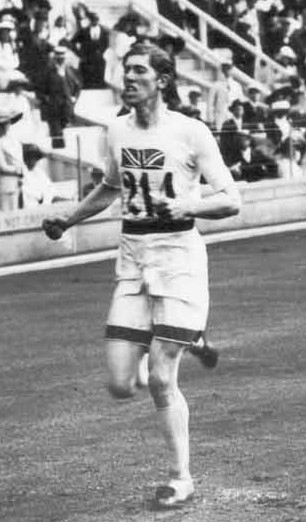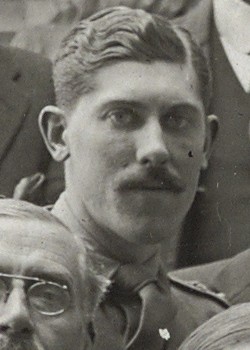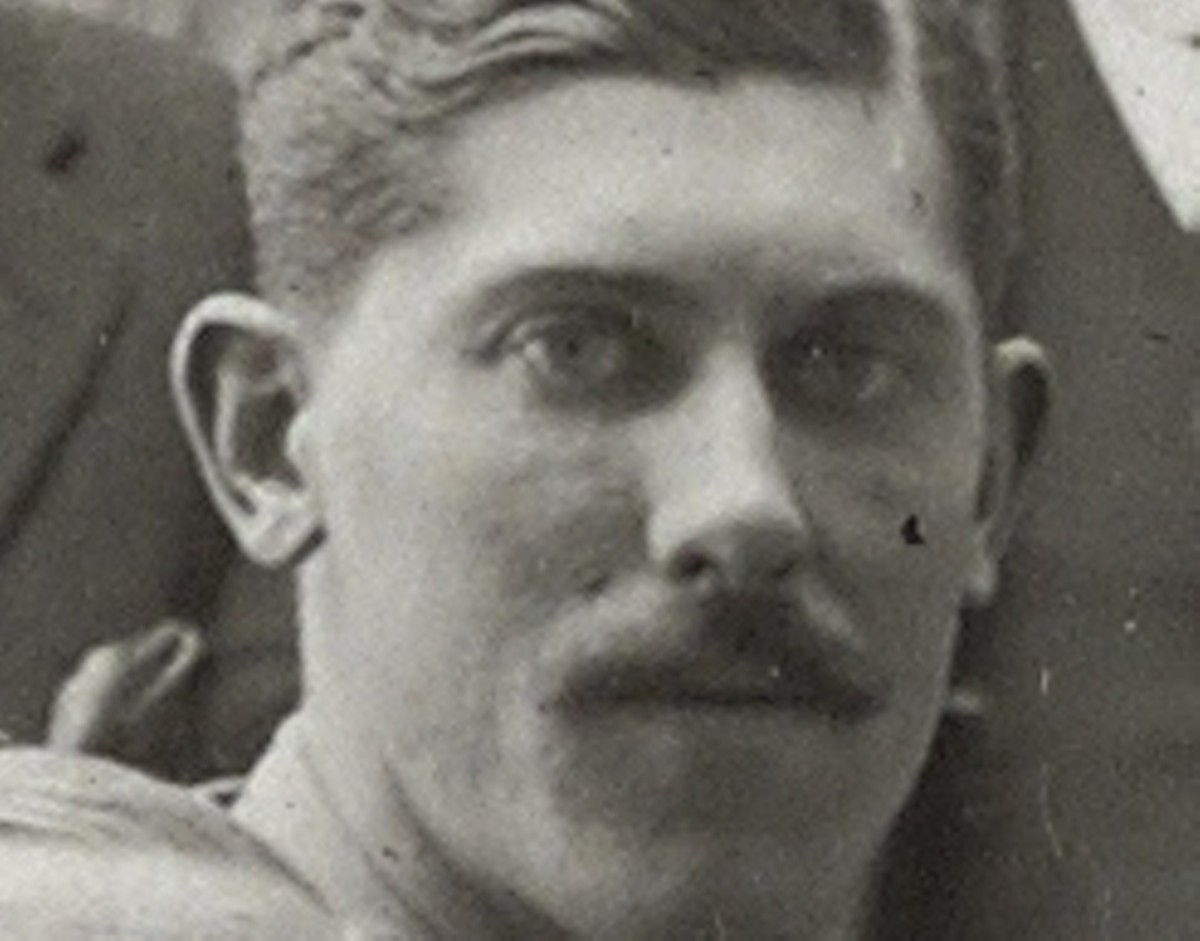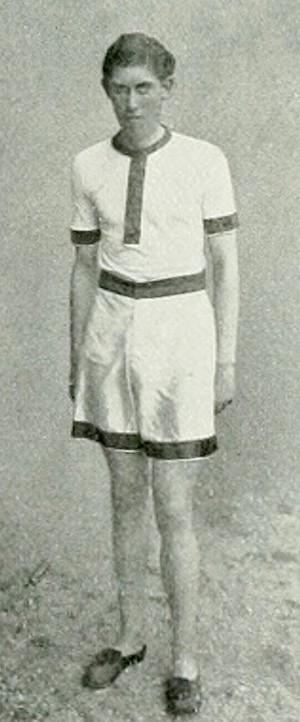Winner of the 1500-meter race in the Stockholm Olympics in 1912, Strode-Jackson lived in New Albany and Louisville from 1920 until the start of World War II. His time of 3:58:8 stood as an Olympic record for twelve years. Not until 1924 did his record fall to the great Paavo Nurmi, "the Finnish Flash." Besides his athletic skills, Strode-Jackson had a heroic military career, was a distinguished diplomat, author, and an art lecturer and curator at the Speed Art Museum. He helped dream up the Kentucky Derby Festival. An eccentric, unconventional, larger-than-life figure, he deserves to be remembered.

Born in Addlestone, Surrey, England in 1891, Strode-Jackson studied law at Brasenose College, Oxford University, from 1910 to 1914. Besides his accomplishments in track, he rowed, played football (soccer), and was captain of the Oxford hockey team. He won the mile race for Oxford against Cambridge three times and was captain of the winning Oxford team at the Penn Relays in 1914.
Strode-Jackson's introduction to track and field may have come from his uncle, Clement Jackson, who set a record in the 120-yard-high hurdles in 1867. Clement Jackson subsequently became an officer for 60 years of the Oxford University Athletic Club, an institution that led the way in establishing standards for track events. A mentor, coach and trusted official, he was not wholeheartedly impartial, and "it is estimated that the Oxford University Athletic Club owes perhaps twenty Varsity match victories to his dark Blue bias and disdain for Cambridge."
Good genes may have been responsible for the success of Clement Jackson’s nephew. To all appearances, rigorous training was not. Arnold Nugent Strode-Jackson claimed to prefer walking, golf, and massages to more normal race preparations. Characteristically, he later credited his Olympic victory to a good night's sleep and staying in bed until it was time to go the stadium for his race. But his secret was to work out in the middle of the night, so opponents could not size him up.
American hopes were high for victory in the 1500-meter run in 1912, since seven runners in the final were from the U.S.A. The favorite was Abel Kiviat, who broke the 1500-meter world record in the Olympic trials. Kiviat, who was from Staten Island, New York, was Jim Thorpe's roommate. Thorpe, the outstanding American Indian sports figure, won both the pentathlon and decathlon in 1912, but was tragically compelled to forfeit his medals when it was learned that he had played professional baseball.
Strode-Jackson had a distinct disadvantage since Oxford ran on a righthanded track and ran three laps to the mile. He had never competed in a four-lap track and had never run with left foot inside. Kiviat took the lead in the last lap and Strode-Jackson joined Kiviat in front of the pack in the final meters. "Jacker," as he was nicknamed, always liked to win putting on the steam at the end: "It was not my custom to make the pace. The thrill of a race was in watching and laying back, within reasonable striking distance, and determining when to put on the final sprint." Strode-Jackson's won by less than a meter. Kiviat was awarded the silver. All five of the top finishers broke the previous Olympic record.
Even more remarkable, Strode-Jackson was not an official member of the British team. He was a walk-on, 1912 being the last year that was permitted.
He claimed to have ran on a whim, interrupting a fishing trip to Sweden.
Besides being a great athlete, Strode-Jackson had a meteoric military career. He was one of the most highly decorated British officers in World War I. He was commissioned a second lieutenant in 1914, made a captain in 1916, a brevet-major in 1917 and a lieutenant colonel in 1918. He was named an acting Brigadier-General, at the time, the youngest person to hold that rank in the British Army. General Sir Douglas Haig mentioned his heroism six times in official dispatches. He was awarded the Distinguished Service Order for conspicuous gallantry and devotion to duty. The war put an end to his athletic career: he was wounded three times and left permanently lame.
After the war he was appointed to his country's delegation to the Paris Peace Conference and served in 1918 and 1919. For that role, he was awarded Commander of the British Empire. At this point you might imagine that as an Olympic gold medalist, highly decorated soldier and prominent civil servant, Strode-Jackson would have been well on his way to becoming a Member of Parliament or British cabinet minister. But love turned the wheel of fate. In 1918, our hero married Dora Merryman Mooney of Silver Hills, New Albany, In. Initially, he worked in Louisville at the Globe Tanning Company, his father-in-law’s business. None of Strode-Jackson’s Louisville jobs lasted very long.
Newspaper clippings of the day note that Jackson had been a lecturer in fine arts at the University of Louisville for three years and was Secretary (curator) of the J.B. Speed Memorial Museum (now the Speed Art Museum). In that capacity he wrote an “Art Notes” column for the Louisville Courier-Journal in 1928 and 1929. At the Speed he was involved with a pioneering show of early Kentucky portraitist, Matthew Harris Jewett in 1929 and subsequently published a novel based on Jewett's life in 1956.
Strode-Jackson also curated the “Harmon Foundation Exhibition of Negro Art” in its 1929 Speed venue. In his “Art Notes” for April 14, 1929, he gave the exhibition unstinting praise, singling out Archibald J. Motley, Jr., for his “receptivity to new ideas based on a solid foundation, fresh color scheme,” and “continental touch.”
In the early 1930s, our subject became a trust officer with the Fidelity and
Columbia Trust Company and in 1936 was general sales manager of the Adler Piano Manufacturing Company in Louisville (although the company had ceased making new instruments nearly a decade earlier). During World War Il he was posted in New York as an “administrative officer of the Inspection Board in charge of inspectors and anti-sabotage precautions." His job was to be a kind of TSA chief for British shipping.
In 1936, ‘Jacker’ took part in organizing the first Kentucky Derby Festival.
He was executive vice-president of the Kentucky Derby Festival Association, and The Louisville Times reported him to have "been an outstanding figure in bringing plans for the festival to completion." The 1936 Festival was a one-off, which did not get repeated until 1956 (possibly because of the 1937 flood).
One other moment brought him into the spotlight. In 1934 the Courier-Journal reported that Strode-Jackson had routed an armed robber who attempted to commandeer his car while driving home from St. Louis. and his wife were stopped at a railroad crossing to allow a freight train to pass. A man jumped on the running board, flourished a pistol, and commanded "drive." Immediately, the Olympic gold medalist and former war hero seized the barrel of the gun, jumped out of the car, and wrestled the would-be robber to the ground. The assailant escaped and no one was injured.
A 1964 obituary for his wife, Dora, suggested that she may have been the first woman in Kentucky to have earned an airplane pilot’s license, and was once winner of the Falls City Golf championship.
One final Arnold Nugent Strode-Jackson story: he did not return to Louisville after World War II, but became a Justice of the Peace in Connecticut. He was once performing a civil marriage between a Roman Catholic and a Protestant. The Catholic groom asked the J.P. to introduce some Latin into the ceremony. Strode-Jackson used the Brasenose College Latin grace. When questioned, he told the couple that its meaning was that they should be very grateful for what they were about to receive.
Inspiration comes wherever one can find it. With the opening of Louisville’s Norton Healthcare Sports and Learning Center, and the Humana Outdoor Track and Field three years ago, perhaps Arnold Nugent Strode-Jackson’s record may become better-known.










